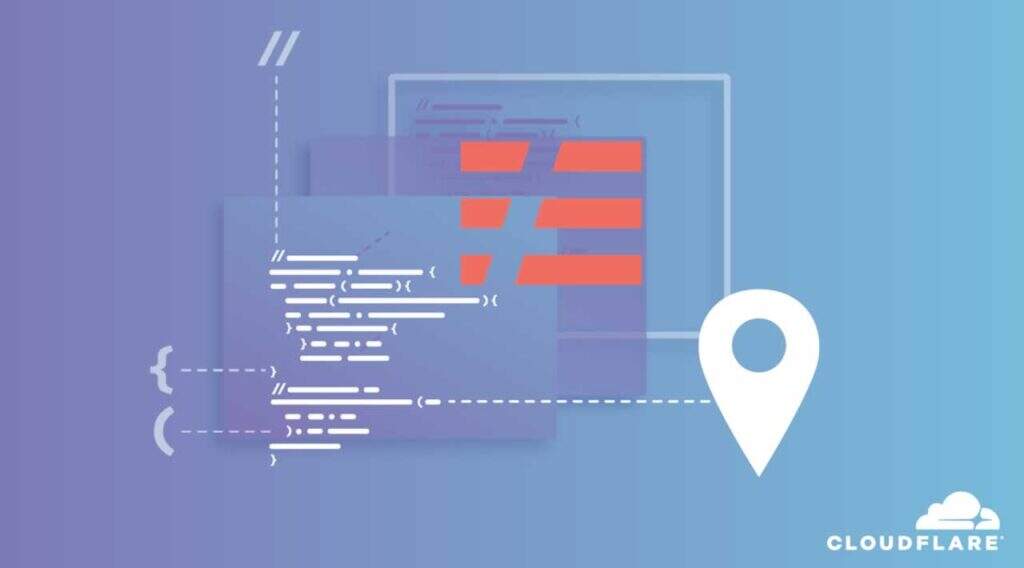Cloudflare has always been my favorite manufacturer, free packages can provide good service, but now it has been spoiled, the domestic access speed is not as fast as before, but on the whole, it is still better than none.
but the free version of Cloudflare CDN has a very fatal disadvantage is that it can not distinguish visitors according to cookie, so as to provide targeted access content (for example, no cache for users who have logged in and commented on). And caching the information of logged-in or commented users is hard to accept, which is one of the important reasons why I abandoned Cloudflare. With the advent of
, however, this problem has been solved, and we can use Workers to bypass this limitation and write our own caching strategy.
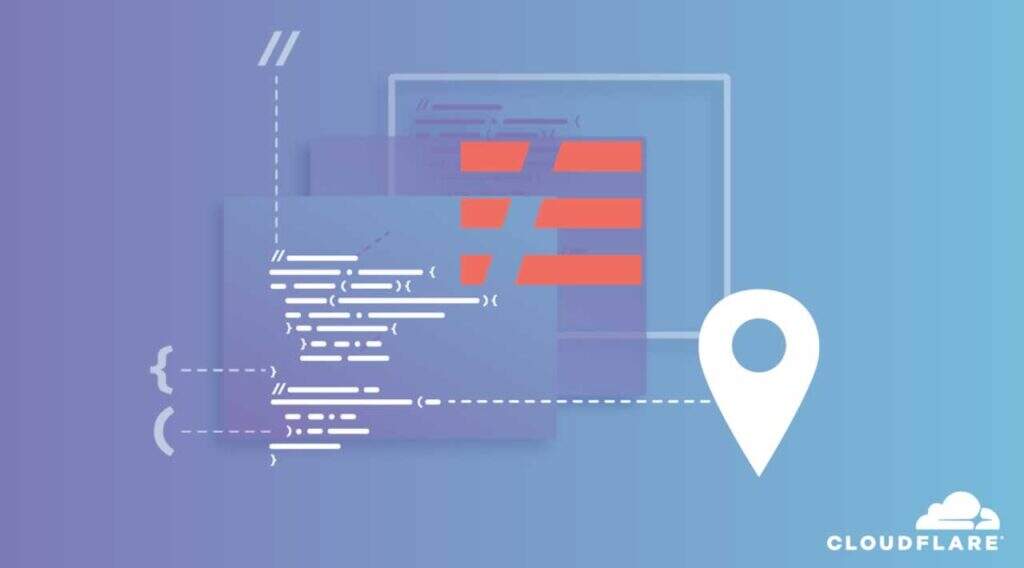
introduction
on Cloudflare Workers introduction can be searched on their own, through the search engine to see this literati may have some knowledge.
I will briefly explain that the content of this article is to implement a custom caching strategy through a script that has been written officially by Cloudflare.
Edge Cache HTML
Cloudflare officially wrote a WordPress plug-in to work with edge-cache-html, but the project has not been updated for nearly two years. It should be thought that the project will affect the sale of their paid packages.
https://github.com/cloudflare/worker-examples/tree/master/examples/edge-cache-html
currently uses this script directly, does not work under WordPress, and is missing URL path rules. I made a slight modification to add path exclusion and support for caching under WordPress (remove header cache judgment). For the pre-operation of
, please refer to [WordPress] use Cloudflare Workers to cache the HTML page of the blog. It is written in great detail, but the blogger did not cache it successfully.
the following is the modified script
// IMPORTANT: Either A Key/Value Namespace must be bound to this worker script
// using the variable name EDGE_CACHE. or the API parameters below should be
// configured. KV is recommended if possible since it can purge just the HTML
// instead of the full cache. // Default cookie prefixes for bypass
const DEFAULT_BYPASS_COOKIES = [
"wp-",
"wordpress",
"comment_",
"woocommerce_"
];
// URL paths to bypass the cache (each pattern is a regex)
const BYPASS_URL_PATTERNS = [
//wp-admin/.*/,
//wp-adminlogin/.*/
];
/**
* Main worker entry point.
*/
addEventListener("fetch", event => {
const request = event.request;
let upstreamCache = request.headers.get('x-HTML-Edge-Cache');
// Only process requests if KV store is set up and there is no
// HTML edge cache in front of this worker (only the outermost cache
// should handle HTML caching in case there are varying levels of support).
let configured = false;
if (typeof EDGE_CACHE !== 'undefined') {
configured = true;
} else if (CLOUDFLARE_API.email.length && CLOUDFLARE_API.key.length && CLOUDFLARE_API.zone.length) {
configured = true;
}
// Bypass processing of image requests (for everything except Firefox which doesn't use image/*)
const accept = request.headers.get('Accept');
let isImage = false;
if (accept && (accept.indexOf('image/*') !== -1)) {
isImage = true;
}
if (configured && !isImage && upstreamCache === null) {
event.passThroughOnException();
event.respondWith(processRequest(request, event));
}
});
/**
* Process every request coming through to add the edge-cache header,
* watch for purge responses and possibly cache HTML GET requests.
*
* @param {Request} originalRequest - Original request
* @param {Event} event - Original event (for additional async waiting)
*/
async function processRequest(originalRequest, event) {
let cfCacheStatus = null;
const accept = originalRequest.headers.get('Accept');
const isHTML = (accept && accept.indexOf('text/html') >= 0);
let {response, cacheVer, status, bypassCache} = await getCachedResponse(originalRequest);
if (response === null) {
// Clone the request, add the edge-cache header and send it through.
let request = new Request(originalRequest);
request.headers.set('x-HTML-Edge-Cache', 'supports=cache , purgeall , bypass-cookies');
response = await fetch(request);
if (response) {
const options = getResponseOptions(response);
if (options && options.purge) {
await purgeCache(cacheVer, event);
status += ', Purged';
}
bypassCache = bypassCache , , shouldBypassEdgeCache(request, response);
if ((!options , , options.cache) && isHTML &&
originalRequest.method === 'GET' && response.status === 200 &&
!bypassCache) {
status += await cacheResponse(cacheVer, originalRequest, response, event);
}
}
} else {
// If the origin didn't send the control header we will send the cached response but update
// the cached copy asynchronously (stale-while-revalidate). This commonly happens with
// a server-side disk cache that serves the HTML directly from disk.
cfCacheStatus = 'HIT';
if (originalRequest.method === 'GET' && response.status === 200 && isHTML) {
bypassCache = bypassCache , , shouldBypassEdgeCache(originalRequest, response);
if (!bypassCache) {
const options = getResponseOptions(response);
if (!options) {
status += ', Refreshed';
event.waitUntil(updateCache(originalRequest, cacheVer, event));
}
}
}
}
if (response && status !== null && originalRequest.method === 'GET' && response.status === 200 && isHTML) {
response = new Response(response.body, response);
response.headers.set('x-HTML-Edge-Cache-Status', status);
if (cacheVer !== null) {
response.headers.set('x-HTML-Edge-Cache-Version', cacheVer.toString());
}
if (cfCacheStatus) {
response.headers.set('CF-Cache-Status', cfCacheStatus);
}
}
return response;
}
/**
* Determine if the cache should be bypassed for the given request/response pair.
* Specifically, if the request includes a cookie that the response flags for bypass.
* Can be used on cache lookups to determine if the request needs to go to the origin and
* origin responses to determine if they should be written to cache.
* @param {Request} request - Request
* @param {Response} response - Response
* @returns {bool} true if the cache should be bypassed
*/
function shouldBypassEdgeCache(request, response) {
let bypassCache = false;
// Bypass the cache for all requests to a URL that matches any of the URL path bypass patterns
const url = new URL(request.url);
const path = url.pathname + url.search;
if (BYPASS_URL_PATTERNS.length) {
for (let pattern of BYPASS_URL_PATTERNS) {
if (path.match(pattern)) {
bypassCache = true;
break;
}
}
}
if (request && response) {
const options = getResponseOptions(response);
const cookieHeader = request.headers.get('cookie');
let bypassCookies = DEFAULT_BYPASS_COOKIES;
if (options) {
bypassCookies = options.bypassCookies;
}
if (cookieHeader && cookieHeader.length && bypassCookies.length) {
const cookies = cookieHeader.split(';');
for (let cookie of cookies) {
// See if the cookie starts with any of the logged-in user prefixes
for (let prefix of bypassCookies) {
if (cookie.trim().startsWith(prefix)) {
bypassCache = true;
break;
}
}
if (bypassCache) {
break;
}
}
}
}
return bypassCache;
}
const CACHE_HEADERS = ['Cache-Control', 'Expires', 'Pragma'];
/**
* Check for cached HTML GET requests.
*
* @param {Request} request - Original request
*/
async function getCachedResponse(request) {
let response = null;
let cacheVer = null;
let bypassCache = false;
let status = 'Miss';
// Only check for HTML GET requests (saves on reading from KV unnecessarily)
// and not when there are cache-control headers on the request (refresh)
const accept = request.headers.get('Accept');
const cacheControl = request.headers.get('Cache-Control');
let noCache = false;
// if (cacheControl && cacheControl.indexOf('no-cache') !== -1) {
// noCache = true;
// status = 'Bypass for Reload';
// }
if (!noCache && request.method === 'GET' && accept && accept.indexOf('text/html') >= 0) {
// Build the versioned URL for checking the cache
cacheVer = await GetCurrentCacheVersion(cacheVer);
const cacheKeyRequest = GenerateCacheRequest(request, cacheVer);
// See if there is a request match in the cache
try {
let cache = caches.default;
let cachedResponse = await cache.match(cacheKeyRequest);
if (cachedResponse) {
// Copy Response object so that we can edit headers.
cachedResponse = new Response(cachedResponse.body, cachedResponse);
// Check to see if the response needs to be bypassed because of a cookie
bypassCache = shouldBypassEdgeCache(request, cachedResponse);
// Copy the original cache headers back and clean up any control headers
if (bypassCache) {
status = 'Bypass Cookie';
} else {
status = 'Hit';
cachedResponse.headers.delete('Cache-Control');
cachedResponse.headers.delete('x-HTML-Edge-Cache-Status');
for (header of CACHE_HEADERS) {
let value = cachedResponse.headers.get('x-HTML-Edge-Cache-Header-' + header);
if (value) {
cachedResponse.headers.delete('x-HTML-Edge-Cache-Header-' + header);
cachedResponse.headers.set(header, value);
}
}
response = cachedResponse;
}
} else {
status = 'Miss';
}
} catch (err) {
// Send the exception back in the response header for debugging
status = "Cache Read Exception: " + err.message;
}
}
return {response, cacheVer, status, bypassCache};
}
/**
* Asynchronously purge the HTML cache.
* @param {Int} cacheVer - Current cache version (if retrieved)
* @param {Event} event - Original event
*/
async function purgeCache(cacheVer, event) {
if (typeof EDGE_CACHE !== 'undefined') {
// Purge the KV cache by bumping the version number
cacheVer = await GetCurrentCacheVersion(cacheVer);
cacheVer++;
event.waitUntil(EDGE_CACHE.put('html_cache_version', cacheVer.toString()));
} else {
// Purge everything using the API
const url = "https://api.cloudflare.com/client/v4/zones/" + CLOUDFLARE_API.zone + "/purge_cache";
event.waitUntil(fetch(url,{
method: 'POST',
headers: {'X-Auth-Email': CLOUDFLARE_API.email,
'X-Auth-Key': CLOUDFLARE_API.key,
'Content-Type': 'application/json'},
body: JSON.stringify({purge_everything: true})
}));
}
}
/**
* Update the cached copy of the given page
* @param {Request} originalRequest - Original Request
* @param {String} cacheVer - Cache Version
* @param {EVent} event - Original event
*/
async function updateCache(originalRequest, cacheVer, event) {
// Clone the request, add the edge-cache header and send it through.
let request = new Request(originalRequest);
request.headers.set('x-HTML-Edge-Cache', 'supports=cache , purgeall , bypass-cookies');
response = await fetch(request);
if (response) {
status = ': Fetched';
const options = getResponseOptions(response);
if (options && options.purge) {
await purgeCache(cacheVer, event);
}
let bypassCache = shouldBypassEdgeCache(request, response);
if ((!options , , options.cache) && !bypassCache) {
await cacheResponse(cacheVer, originalRequest, response, event);
}
}
}
/**
* Cache the returned content (but only if it was a successful GET request)
*
* @param {Int} cacheVer - Current cache version (if already retrieved)
* @param {Request} request - Original Request
* @param {Response} originalResponse - Response to (maybe) cache
* @param {Event} event - Original event
* @returns {bool} true if the response was cached
*/
async function cacheResponse(cacheVer, request, originalResponse, event) {
let status = "";
const accept = request.headers.get('Accept');
if (request.method === 'GET' && originalResponse.status === 200 && accept && accept.indexOf('text/html') >= 0) {
cacheVer = await GetCurrentCacheVersion(cacheVer);
const cacheKeyRequest = GenerateCacheRequest(request, cacheVer);
try {
// Move the cache headers out of the way so the response can actually be cached.
// First clone the response so there is a parallel body stream and then
// create a new response object based on the clone that we can edit.
let cache = caches.default;
let clonedResponse = originalResponse.clone();
let response = new Response(clonedResponse.body, clonedResponse);
for (header of CACHE_HEADERS) {
let value = response.headers.get(header);
if (value) {
response.headers.delete(header);
response.headers.set('x-HTML-Edge-Cache-Header-' + header, value);
}
}
response.headers.delete('Set-Cookie');
response.headers.set('Cache-Control', 'public; max-age=315360000');
event.waitUntil(cache.put(cacheKeyRequest, response));
status = ", Cached";
} catch (err) {
// status = ", Cache Write Exception: " + err.message;
}
}
return status;
}
/******************************************************************************
* Utility Functions
*****************************************************************************/
/**
* Parse the commands from the x-HTML-Edge-Cache response header.
* @param {Response} response - HTTP response from the origin.
* @returns {*} Parsed commands
*/
function getResponseOptions(response) {
let options = null;
let header = response.headers.get('x-HTML-Edge-Cache');
if (header) {
options = {
purge: false,
cache: false,
bypassCookies: []
};
let commands = header.split(',');
for (let command of commands) {
if (command.trim() === 'purgeall') {
options.purge = true;
} else if (command.trim() === 'cache') {
options.cache = true;
} else if (command.trim().startsWith('bypass-cookies')) {
let separator = command.indexOf('=');
if (separator >= 0) {
let cookies = command.substr(separator + 1).split(' , ');
for (let cookie of cookies) {
cookie = cookie.trim();
if (cookie.length) {
options.bypassCookies.push(cookie);
}
}
}
}
}
}
return options;
}
/**
* Retrieve the current cache version from KV
* @param {Int} cacheVer - Current cache version value if set.
* @returns {Int} The current cache version.
*/
async function GetCurrentCacheVersion(cacheVer) {
if (cacheVer === null) {
if (typeof EDGE_CACHE !== 'undefined') {
cacheVer = await EDGE_CACHE.get('html_cache_version');
if (cacheVer === null) {
// Uninitialized - first time through, initialize KV with a value
// Blocking but should only happen immediately after worker activation.
cacheVer = 0;
await EDGE_CACHE.put('html_cache_version', cacheVer.toString());
} else {
cacheVer = parseInt(cacheVer);
}
} else {
cacheVer = -1;
}
}
return cacheVer;
}
/**
* Generate the versioned Request object to use for cache operations.
* @param {Request} request - Base request
* @param {Int} cacheVer - Current Cache version (must be set)
* @returns {Request} Versioned request object
*/
function GenerateCacheRequest(request, cacheVer) {
let cacheUrl = request.url;
if (cacheUrl.indexOf('?') >= 0) {
cacheUrl += '&';
} else {
cacheUrl += '?';
}
cacheUrl += 'cf_edge_cache_ver=' + cacheVer;
return new Request(cacheUrl);
}
. After the script is deployed on worker, you can add a domain name. For Cloudflare connected to cname, please refer to this article on speed optimization for using Cloudflare CDN domestic websites.
is very easy to install WordPress Page Cache Plugin
, you can upload the plug-in cloudflare-page-cache in WordPress, this plug-in has no graphical interface, does not need any settings, and automatically updateshtml_cache_versioneach time the cache update policy is triggered.
is worth mentioning that the current plug-in has a drawback, after triggering cache updates, all page caches will be invalidated, but followed by NGINX Cache, so it doesn’t matter much.
from can be used to easy to use-quickly build high-performance WordPress guide
Cloudflare Page Rule set
need to disable Cloudflare Page Rule cache, as shown in the figure, let Cloudflare Page Rule cache all the user information will be cached, and now all the rules can be handed over to Edge Cache HTML.
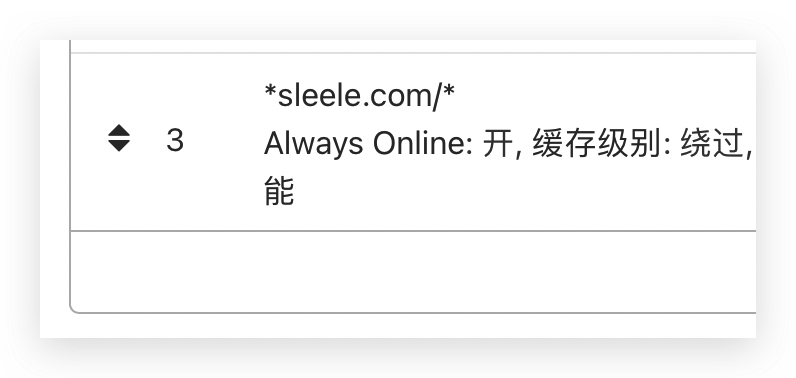
A deployment plug-in
if the above is still too difficult for you, here is a deployment plug-in Edge Cache HTML via Cloudflare Workers.
I slightly modified the plug-in Edge Cache HTML via Cloudflare Workers to add my modified script (edge-cache-html-cloudflare-workers download) so that it can be cached properly.
, fill inCloudflare E-mailandCloudflare API Key, then save and install. After
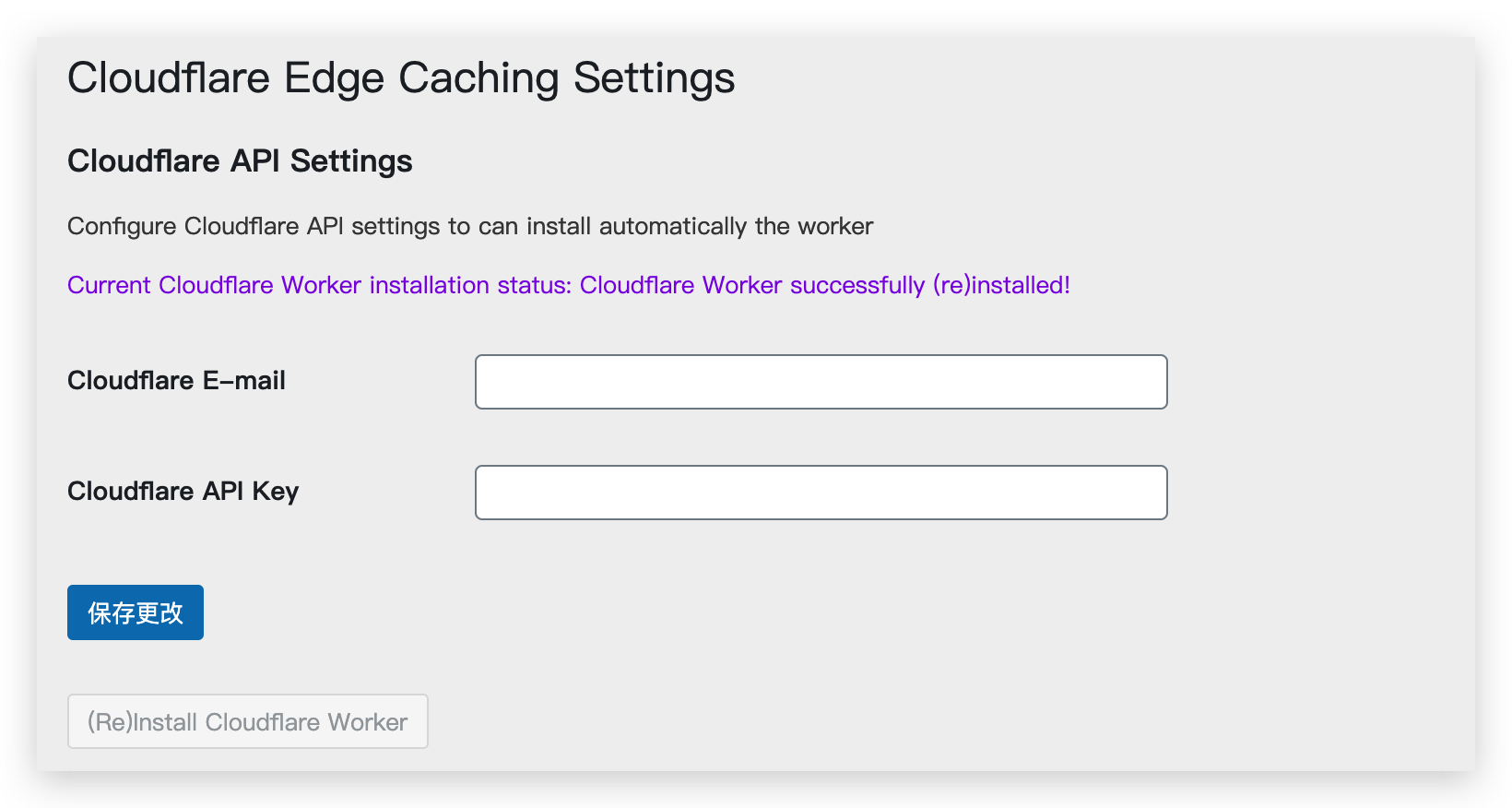
, add router, and Workers KV can be used.
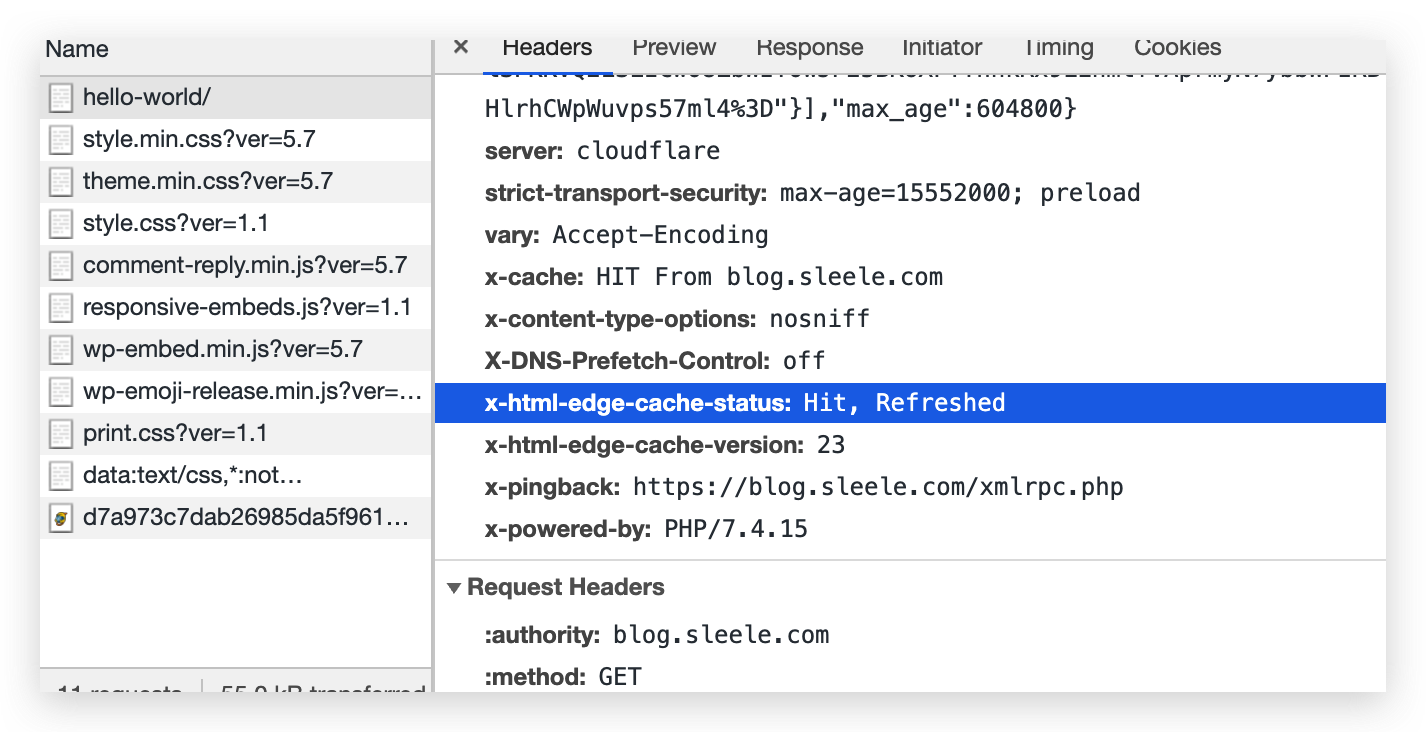
postscript
I have now been transferred to the domestic server, do not need. In fact, if the cache is on, the effect is still quite significant, my TTFB at that time is probably 160ms. If your server is not in China, it is highly recommended that you use Cloudflare Edge Cache HTML to cache your website.
via “sleele’s blog”, with a few changes.
reference article
- [WordPress] uses Cloudflare Workers to cache blog HTML pages
- cloudflare worker-examples Edge Cache HTML
- Fake and free Bypass-on-Cookie, with CloudFlare edge cache workers for WordPress
- Cloudflare WordPress Edge Caching via Workers

